Restoring Immunity After CAR T-Cell Therapy with CD7-Deleted Hematopoietic Stem Cells
The development and regulatory approval of chimeric antigen receptor (CAR) T cells targeting the B cell marker CD19 represents a major breakthrough in cancer immunotherapy. However, using a similar approach to treat T cell malignancies is more challenging due to the shared expression of target antigens by therapeutic, normal, and malignant T cells. These similarities can lead to CAR T-cell fratricide, limiting treatment efficacy. They can also result in healthy cytotoxic effector cells being eliminated, leaving patients at risk of sustained immunodeficiency and susceptibility to opportunistic infections. While fratricide can be avoided during targeted destruction of CD7+ cells by using CAR T cells that lack both CD7 and the T cell receptor, this strategy does not prevent normal T cells from being depleted. To address this issue, Kim et al. deleted the CD7 gene in hematopoietic stem cells (HSCs) and showed the resultant knockouts to preserve T cell numbers in engrafted mice following CAR T-cell treatment.

Gene editing prevents CAR T-cell fratricide
Universal CD7-targeting chimeric antigen receptor T cells (UCART7) are engineered to lack expression of both CD7 and the T cell receptor, preventing them from destroying one another during the therapeutic elimination of CD7+ cells. However, UCART7 cannot distinguish malignant T cells from normal T cells, meaning both are depleted by UCART7 therapy. Although endogenous CD7- T cells survive UCART7 attack, they are limited in number and proliferative capacity, meaning they cannot fully repopulate the immune cell repertoire.
Gene editing prevents CAR T-cell fratricide
Universal CD7-targeting chimeric antigen receptor T cells (UCART7) are engineered to lack expression of both CD7 and the T cell receptor, preventing them from destroying one another during the therapeutic elimination of CD7+ cells. However, UCART7 cannot distinguish malignant T cells from normal T cells, meaning both are depleted by UCART7 therapy. Although endogenous CD7- T cells survive UCART7 attack, they are limited in number and proliferative capacity, meaning they cannot fully repopulate the immune cell repertoire.
CD7-deleted HSCs promise to restore immune function
HSCs can produce cells of the various blood lineages, meaning they have the potential to rescue CD7+ T cells following UCART7 treatment, provided they do not themselves exhibit CD7 expression. To establish the effectiveness of this approach, Kim et al. created CD7 knockout HSCs (CD7-KO HSCs) from human umbilical cord blood CD34+ cells, using CRISPR/Cas9 to delete the CD7 gene, and performed a comprehensive series of studies. The guide RNA (gRNA) used to produce the CD7 knockout was supplied by TriLink.
When the CD7 knockout HSCs were injected into immunodeficient mice, they were shown to engraft and differentiate into mature T cells and natural killer (NK) cells lacking CD7 expression. These demonstrated comparable functionality to control cells, with the CD7-KO T cells displaying similar activation of intracellular signaling pathways in response to stimulation with PMA and IL-2. The CD7-KO NK cells produced equivalent activity in an in vitro tumor killing assay.
To determine whether the CD7-KO HSCs were resistant to therapies targeting CD7, Kim et al. injected control and engrafted mice with UCART7. This was generated from allogeneic T cells that were deleted for TRAC and CD7 genes using TriLink gRNA, followed by insertion of a CD7-targeting CAR. While T cell and NK cell numbers were significantly decreased in the control group, mice engrafted with CD7-KO HSCs maintained T cell and NK cell populations after UCART7 treatment.
Importantly, the CD7-KO T cells used in this study were found to be phenotypically and functionally distinct from endogenous CD7-T cells. This suggests that, in addition to rescuing T cell and NK cell function after UCART7 therapy, CD7-KO T cells may have an important role in supplementing the capabilities of CD7-T cells in patients with T cell malignancies.
Featured product:: sgRNA
Article Reference: Kim MY, Cooper ML, Jacobs MT, et al., CD7-deleted hematopoietic stem cells can restore immunity after CAR T cell therapy, JCI Insight 2021; 6(16):e149819.


